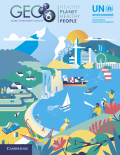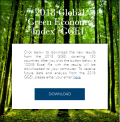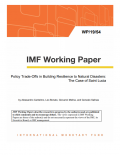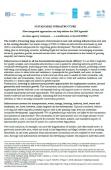

The sixth Global Environment Outlook (GEO-6), focusing on the theme “healthy planet, healthy people”, aims to help policymakers and all of society achieve the environmental dimension of the Sustainable Development Goals, internationally agreed environmental goals and the multilateral environmental agreements. It does so by assessing recent scientific information and data, analyzing current and past environmental policy, and identifying future options for achieving sustainable development by 2050.
GEO-6 builds on previous GEO reports and continues to provide an analysis of the state of the global environment, the global, regional and national policy response as well as the outlook for the foreseeable future. It differs from previous GEO reports in its emphasis on Sustainable Development Goals and in providing possible means of accelerating achievement of these goals. GEO6 is made up of four distinct but closely linked parts.



